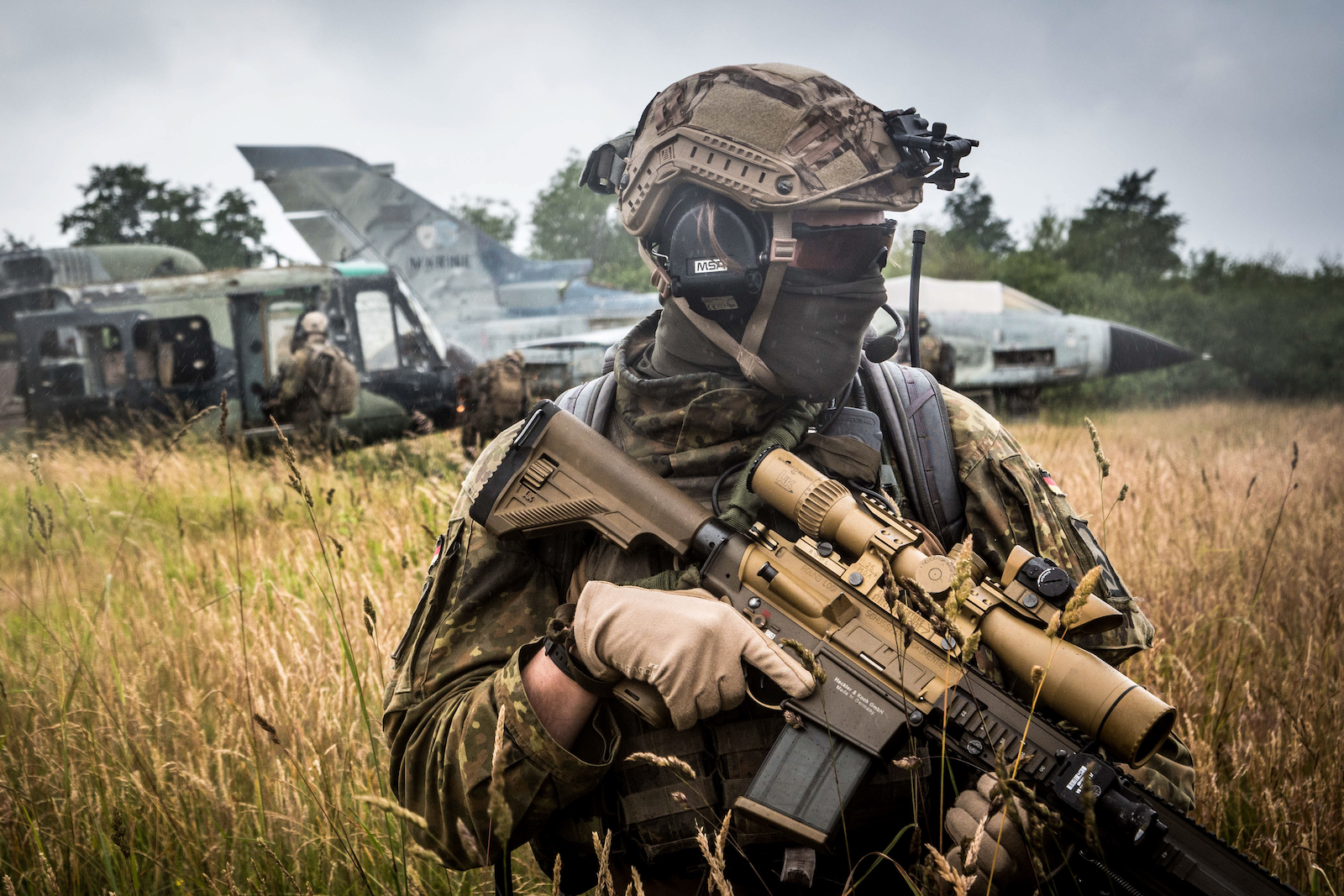
Never Again War? Tracing German Military Identity
The concept of ‘Never again fascism! Never again war!’ has been imbibed within those familiar with the Buchenwald Oath. Yet, until recent times, the words “Germany” and “Germans” were associated with a narrative that almost certainly includes the Third Reich from 1933 to 1945. The 21st century Germany is chronologically the successor of the Nazi state, and in being so, its history cannot be unwritten. Nevertheless, to disassociate its present from the Third Reich, the nation constitutionally committed itself to equality, welfare, and peace for people from all ethnicities and to represent the Federal Republic of Germany for what it truly is.
The image of a non-military nation was considered sacrosanct to the Germans after the end of the Second World War. The identity of West Germany was underscored with guilt while the identity of East Germany was emphasized with denazification. The famous picture of Chancellor Brandt kneeling at the memorial for the Warsaw ghetto in 1970 augments the claim of a sense of guilt. Chancellor Brandt was quoted saying, “Under the weight of recent history, I did what people do when words fail them. In this way, I commemorated millions of murdered people.”
During the Gulf War, West Germany presented itself as a non-military power in the international arena and extended $165 million “emergency aid” to Israel. The government, by January 1991, had contributed $3 billion to the anti-Iraqi coalition. It had also sent 18 fighter jets and 270 pilots and maintenance workers to Turkey. Furthermore, Helmut Kohl, the then Chancellor of West Germany actively supported the anti-Iraqi coalition. However, this support manifested in the form of diplomatic talks.
West Germany’s “indirect involvement” in the conflict signaled to the world that the country was not inadequate militarily but rather chose not to involve themselves in active war. The raison d’être for West Germany’s refusal to participate in the Gulf War was linked to the limitation posed by its own Constitution. According to Article 87a section 2 of the Basic Law for the Federal Republic of Germany, the nation can only use the military to defend itself. Had Chancellor Kohl chosen to join the US in the military operations, it would have conflicted the country’s image of itself.
The understanding of ‘never again war’ soon began to shift from complete avoidance of war to acceptance of war to defeat fascism. Conventionally, ‘never again war’ meant that Germany would reject war altogether. However, it could also be seen as an opposition to fascism and waging war to end the human sufferings caused by fascism. While one notion stressed the importance of non-military action, the other stressed the importance of ending oppression.
The Arab Springs and the democratization of MENA substantiated that war had a positive aspect – it liberated society from the oppressors. Germany soon began to look at a shift in international responsibility as its understanding of peace changed. In 1992, the Defence Minister issued a new guideline for the defence policy. The German army would not only protect its citizens against threats but would also provide military assistance to UN Peacekeeping missions in accordance with the UN Charter. According to Zahfuss “UN operations were, in other words, not really war. Thus, participating in UN operations could, in the new articulation of the ‘Never again war’ principle, again constitute an active opposition to both war and dictatorship.”
Another example of a shift from non-involvement in a military context to military movement was seen during Operation Sharp Guard in 1993. The mission involved enforcing economic sanctions and arms embargo on Yugoslavia in order to create the Peace Agreement for Bosnia and Herzegovina. In Operation Sharp Guard, Germany’s role in a military context became more assertive as they actively participated in policing ships that entered the region. This was a significant step forward for the nation, despite only resorting to monitoring and not stop and search.
The 1997 German white paper on security outlined the future perspectives of German security and defence policy. The German military identity and values, according to Article 304 Chapter III of the white paper, shifted to “safeguard[ing] peace, work[ing] towards European unity…and join[ing] a system of collective unity.” This shift of values led to the belief that the military policy of the Federal Republic of Germany had to focus on participation in multinational efforts in crisis management in the framework of NATO, defend its allies and itself, and develop capabilities to participate in UN and CSCE operations.
The 1997 German white paper rendered itself in the formation of a multinational European army. This was a rational move considering Germany’s willingness to repeatedly engage in foreign military intervention. This claim was corroborated when Germany decided to fire its first bullet abroad during the Kosovo War followed by its decision to expand its military missions in Iraq, Afghanistan and Mali and its involvement in Iraq and Syria through Operation Counter Daesh.
The shift observed in recent times can be seen as Germany’s attempt to please its allies, such as the US. Through Wendt’s concept of social constructivism, it could be interpreted as a strategic move by the nation to ‘upgrade’ its social identity. In his 1999 work titled Social Theory of International Politics, he states that the change in behaviour of allies and the relationship they have with an actor affects the actor’s identity. In other words, the method in which Germany’s allies treat the nation has affected the nation’s definition of itself. Germany’s non-military identity was partly a product of the negative connotation its neighbours attached to its military force during the Third Reich. With a change in political discourse and rhetoric, Germany was able to reinvent its identity and transform itself as a military might in a continent that houses three of the P5 nations and a strong inter-continental alliance called NATO.

